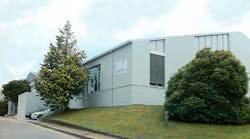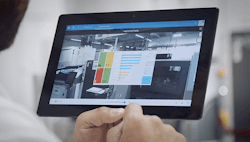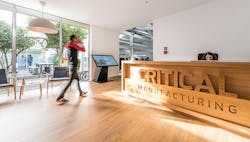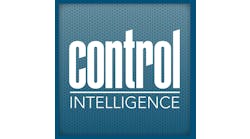Jonathan Karmaou joined Critical Manufacturing as director of business transformation. In his role, Karmaou will establish a consulting practice centered around digital transformation and enterprise implementation strategies and will lead the U.S.-based and offshored project management teams serving Critical’s growing U.S. customer base.
Karmaou is experienced in planning and overseeing digital transformation programs, having spent his entire career in manufacturing, working with large enterprises across many industries including semiconductor, life sciences, automotive, aerospace and defense, pharmaceutical, and food and beverage.
He has held consulting positions at consulting practices with a strong focus on creating center-of-excellence (CoE) governance models, value chain mapping, business process mapping and best-practices-and-standards development across enterprise solutions.
Portugal-headquartered Critical Manufacturing, a subsidiary of ASM Pacific Technology, provides a manufacturing execution system (MES), which helps manufacturers to stay ahead of product traceability and compliance requirements (Figure 1). It is designed to reduce risk with inherent closed-loop quality, integrate seamlessly with enterprise systems and factory automation and provide deep intelligence and visibility of global production operations, making customers Industry-4.0-ready.
What new technologies are driving product development and why?
Jonathan Karmaou, director of business transformation, Critical Manufacturing: The Industrial Internet of Things (IIoT), big data, machine learning (ML) and artificial intelligence (AI) are at the heart of our product development now and into the future. Having accurate operational data in real time, a single digital truth of what is happening on the shop floor and out into the wider supply chain, is critical to driving efficiency and quality into manufacturing processes. By applying ML and AI to the huge volumes of data available throughout the supply chain, our systems predict, analyze, make suggestions and alert when parameters or processes are out of specification. This enables continuous process improvement, enhances production quality, increases efficiency, enables high levels of automation and makes companies more agile, resilient and competitive for the future.
How does the Industrial Internet of Things figure into business strategy?
Jonathan Karmaou, director of business transformation, Critical Manufacturing: IIoT enables tools, machines, robots and sensors to be monitored and controlled and brings real-time operational visibility to the fore. Being able to connect and collect data in real time allows for consistent, continuous improvement of processes, better decision-making to align with wider business strategies. It enables complete visibility into global operations at every level to produce a complete picture to support planning, targeting and execution of business goals.
How will machine automation and controls alter the way companies staff their operations in the future?
Jonathan Karmaou, director of business transformation, Critical Manufacturing: Machine automation and control will reduce reliance on manual interactions. This is not about reducing headcount, but about working smarter and removing error-prone, mundane tasks to get better value out of human assets. It will enable change in how much of the manufacturing process relies on outsourcing and remove opportunities for error through the complete supply chain. In the wake of the COVID-19 pandemic, it will also facilitate the maintenance of operations through remote access and minimize the number of staff required on the shop floor. This will add business resilience and increase safety for personnel.
How is the development of software solutions impacting requirements for hardware?
Jonathan Karmaou, director of business transformation, Critical Manufacturing: In line with the direction of software solutions, OEM and hardware manufacturers need to build hardware with the ability to communicate through different communication protocols, such as OPC-UA, SECS/GEM, TCP/IP, RS-232 or IPC-CFX. Whether IP Ethernet ports, serial ports or wireless communication, hardware needs to be compatible with software and be able to support, not limit, the increased information exchange that comes with smart manufacturing.
As engineering and IT continue their convergence, which one is and/or will be leading the direction of future automation and technology?
Jonathan Karmaou, director of business transformation, Critical Manufacturing: These areas are merging and, in line with this trend, we are seeing a new era beginning of hybrid engineering. Along with mechanical and electrical expertise, understanding IT infrastructure, security and communication are vital to engineering roles. Currently, the information exchange between areas of engineering has a crucial impact on overall manufacturing processes. Overall, which will lead the future of automation and technology? I believe neither will dominate, but, instead, a new discipline of hybrid engineering will emerge that will combine expertise from both areas to develop automation and manufacturing technology for the future.
Figure 2: Using tightly coupled modules, the Critical Manufacturing system is designed to open a pathway to high levels of automation and full Industry 4.0 functionality.
Looking into the future, how will technology change your organization or other organizations over the next five years?
Jonathan Karmaou, director of business transformation, Critical Manufacturing: Over the past year, COVID-19 has impacted and accelerated the move to digitalization. It has reduced the need to travel and focused the need to be able to work remotely from anywhere in the world and access both IT and shop-floor systems in a secure and robust way. As we move toward Industry 4.0 in manufacturing settings, we will also see higher levels of automation and increasing connection of global operations, with the analysis of global data streams driving levels of efficiency, manufacturing flexibility and continuous process improvement further and further.
Critical Manufacturing will continue to develop bleeding-edge technology for holistic monitoring and control of global manufacturing supply chains. From the ground up, our MES is designed to encompass new technologies as they emerge. Following the pandemic, we will likely see continued and increasing use of remote technology in the development, commissioning and maintenance of systems. To this end, it will not only be manufacturing processes that continue to become more efficient, but also the way in which we manage projects and deploy systems.
What are three key things that a machine builder, system integrator or manufacturer should know about your organization?
Jonathan Karmaou, director of business transformation, Critical Manufacturing: Critical Manufacturing is an innovator and provides the most modern manufacturing-execution-system (MES) solution in the market to meet the needs of companies with complex manufacturing processes and high-tech products. Using tightly coupled modules, the system offers rich out-of-the-box functionality, extensive configurability to meet individual needs with less coding, and opens a pathway to high levels of automation and full Industry 4.0 functionality (Figure 2).
Figure 3: Critical Manufacturing fosters a strong vision of the future of manufacturing and what its customers need to do to achieve all the benefits of a smart factory.
The innovation in our MES comes from the entirety of the solution. It provides rich features and modules to monitor, control and optimize operations on top of latest technology platforms. It is a combination of MES and manufacturing operations management (MOM) with a high-performing data platform.
Critical Manufacturing as a company is deeply committed to excellence. We foster a culture of teamwork and, along with our carefully selected partners, work without individual barriers to ensure our customers and all within our business get the support they need when they need it.
Although we are primarily an MES software company, Critical Manufacturing has a strong vision of the future of manufacturing and what our customers need to do to achieve all the benefits of a smart factory (Figure 3). We are prepared to assist with our customers’ digital transformation efforts and strive to understand their entire application footprint and value chain to ensure systems, integration and automation are aligned so they can get the most out of their MES solution.






